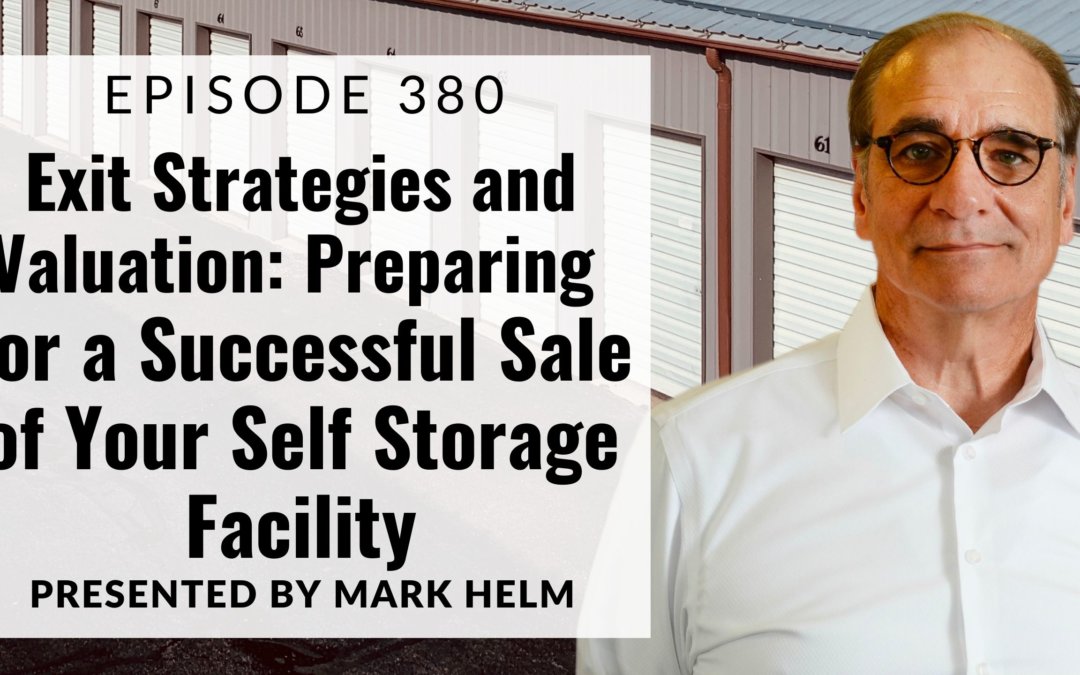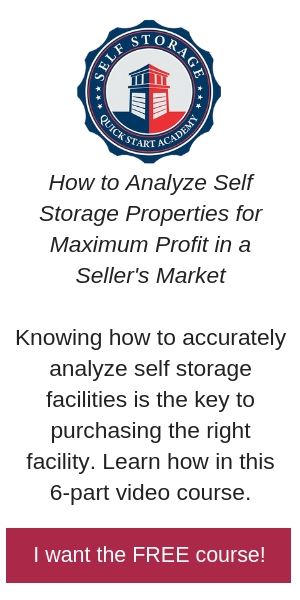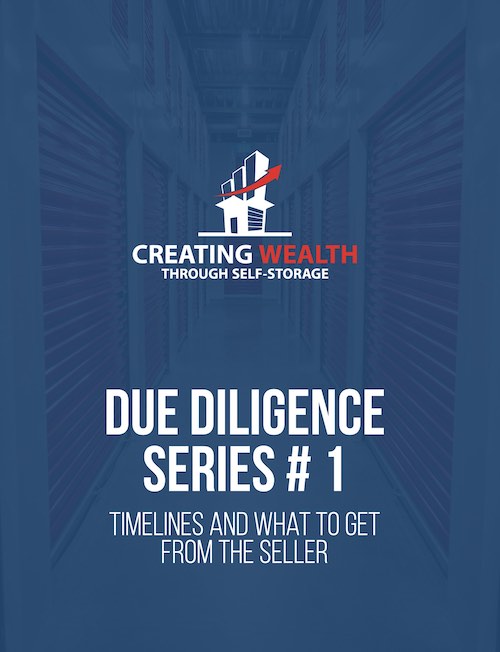We talk a lot about buying self storage in these episodes. Let’s discuss selling.
Believe it or not, there is a skill to successfully selling a self storage project and maximizing your returns yields for your partners and investors.
Like most things in my life, I have learned the hard way many of these lessons I am going to discuss.
When we buy our first or next facility, most of the time, we are not thinking about selling it.
However, I always recommend having an exit strategy, at least partially figured out, when we buy. It gives us direction and a starting place for many of the decisions we will make during the ownership. Decisions like do I add door alarms? How much space shall I expand? Do I sell retail items?
For us smaller self storage owners, the eventual sale of our business is an important consideration. No matter what drives us to get into the business, a well-planned exit strategy is essential.
Let’s explore key elements of successfully preparing for the sale of your self storage project.
Valuation:
Determining the value of your self storage project is a critical first step in the sales process. The most common method is the income-based approach. What will a ready, willing, and able buyer pay for your current income?
Basically, that is your NOI divided by the going CAP rate.
Sounds simple. But not really.
Your NOI is a function of your income less operating expenses. But is your income market income? Are your expenses within industry percentages? Is your NOI really anywhere near close to what the typical buyer of this type of facility will have?
Engaging a good, seasoned real estate professional specializing in the sale of self storage is critical, in my opinion, if you do not engage in selling storage very often. They can guide you in determining value and ensure you do not underestimate your value.
In fact, interview a few of them and get various opinions of what the market will pay for your project.
I have seen good Brokers tell potential sellers, “Now is not the best time for you to sell,” or something like, “let’s improve the value of your facility first, then let’s go to market.”
How To Maximize Value:
Before initiating the sale process, maximizing the value of your self-storage business is crucial.
Improving key areas of your operations can make your project more attractive to potential buyers and increase its market value. Focus on improving operational efficiency, streamlining processes, and optimizing revenue streams.
Invest in maintaining and upgrading your facility, ensuring it is well-maintained and visually appealing—things like improved doors, landscaping, etc.
I have often found that leaving a little of the income on the table helps. For example, we may have a couple of price increases a year. By not implementing the second one, we can usually get a portion of that increase in sales value but have the story that there is still some upward movement in pricing for the new owner.
We have often found this a good strategy.
Also, be sure your financial record is in good shape. I can’t tell you how much value this adds.
When a buyer can’t figure something out from looking at your p & l or balance sheet, they will assume the worst and discount. Maintaining accurate financial records and providing detailed documentation on expenses, leases, and contracts will instill buyer confidence and facilitate a smoother due diligence process, not to mention higher values.
Preparing Documentation:
Before your facility hits the market, organizing the necessary documentation is crucial to demonstrate the value and what a buyer will seek in the due diligence process.
Compile financial statements, operational monthly closes, tax returns, lease agreements, service contracts, and other relevant records. I recommend putting them in a drop box for a future buyer or for your Broker to have access to.
Your goal, if working with a Broker or directly with a buyer, is to provide a clear picture of the facility’s performance and a good story of the project’s potential future growth.
Confidentiality and Marketing Strategy:
Maintaining confidentiality during the sales process is crucial to protect our self storage business, not to mention maintaining tenant and employee confidence.
You, or if engaging a Broker, ask them to explain their targeted marketing strategy that identifies potential buyers while ensuring the confidentiality of sensitive information.
Qualified prospects should be required to sign non-disclosure agreements (NDAs) before accessing detailed business information. Again, if this is not something you have done or do often, collaborating with a competent self storage broker can help safeguard confidentiality and attract serious, qualified buyers.
Negotiating and Closing the Sale:
Once you have identified a potential buyer, the negotiation process begins.
It is essential to clearly understand your desired terms and conditions, including the sale price, payment structure, transition period, and potential contingencies.
Ensure your attorney is involved and issues such as representations and warranties past the closing are addressed. In this phase of the process, your attorney is critical. I cannot tell you how many goofy things I have seen buyer’s attorneys slip into contracts that I would not have caught or even recognized as a potential landmine.
Conclusion:
There is a real art to successfully selling your facility, just like when you buy one.
If you are doing it right, preparing for the sale of your self storage project requires careful planning, strategic execution, and professional guidance. Then you can maximize all the time, effort, and resources you have put into your project.
Then, if everything is done well, you have a new problem. What to do with your money.
But that is another episode.




I love your blogs and videos. Four years ago I purchased an old manufacturing facility and I converted into a 380 or so unit indoor climate controlled facility in Buffalo NY. The only book I ever read about self storage was yours. So, thank you. Also I have one question about your blog above. You mentioned “goofy things I’ve seen buyer’s attorneys slip into contracts…”. I’m curious to know about these goofy things, so I can be in the lookout come the day I might sell my business. Maybe there’s a blog there? Thanks!
Usually it deals with either representations & warranties, or something new that was not in the LOI, like suto extensions on due diligence period.